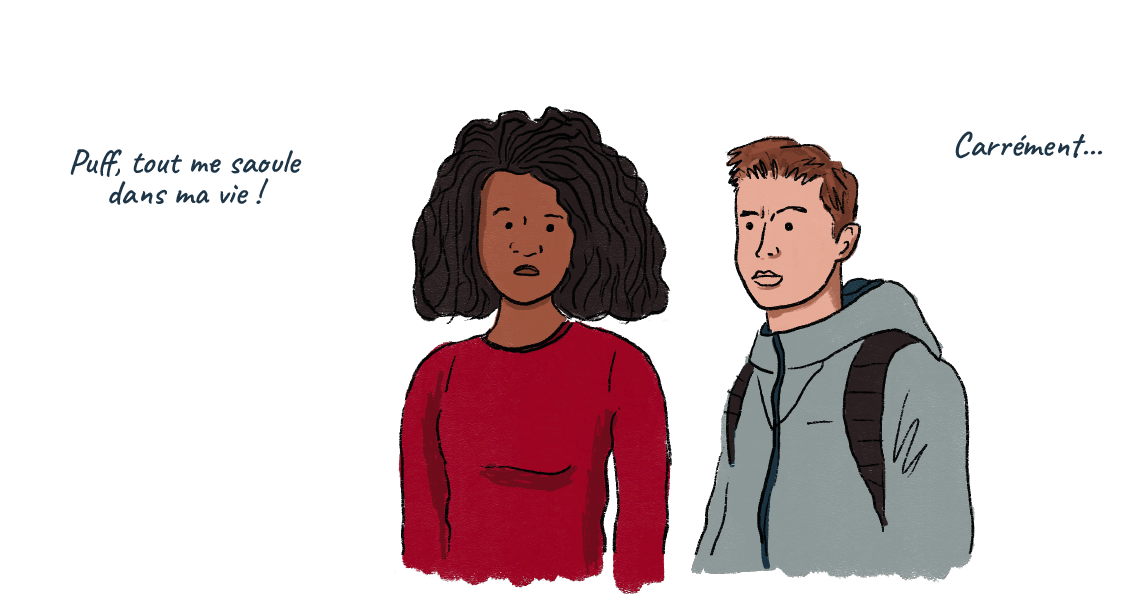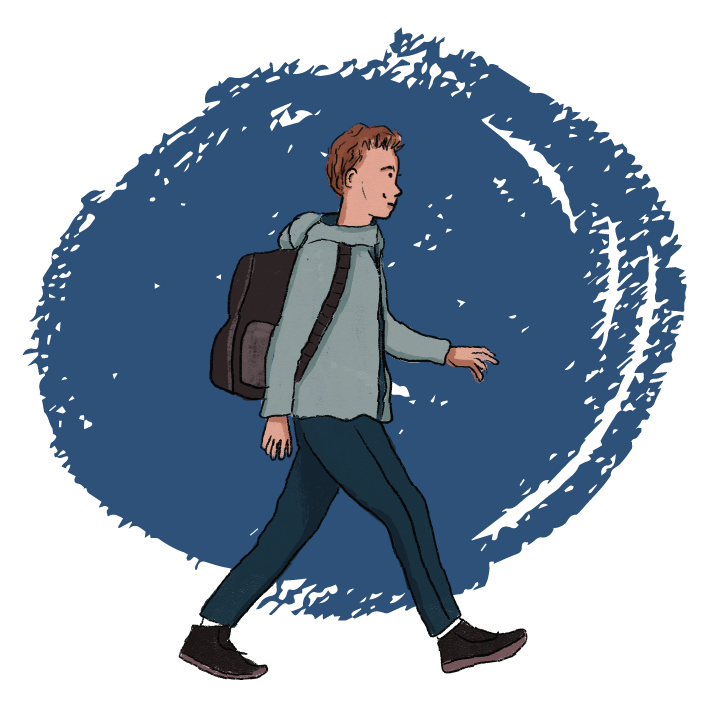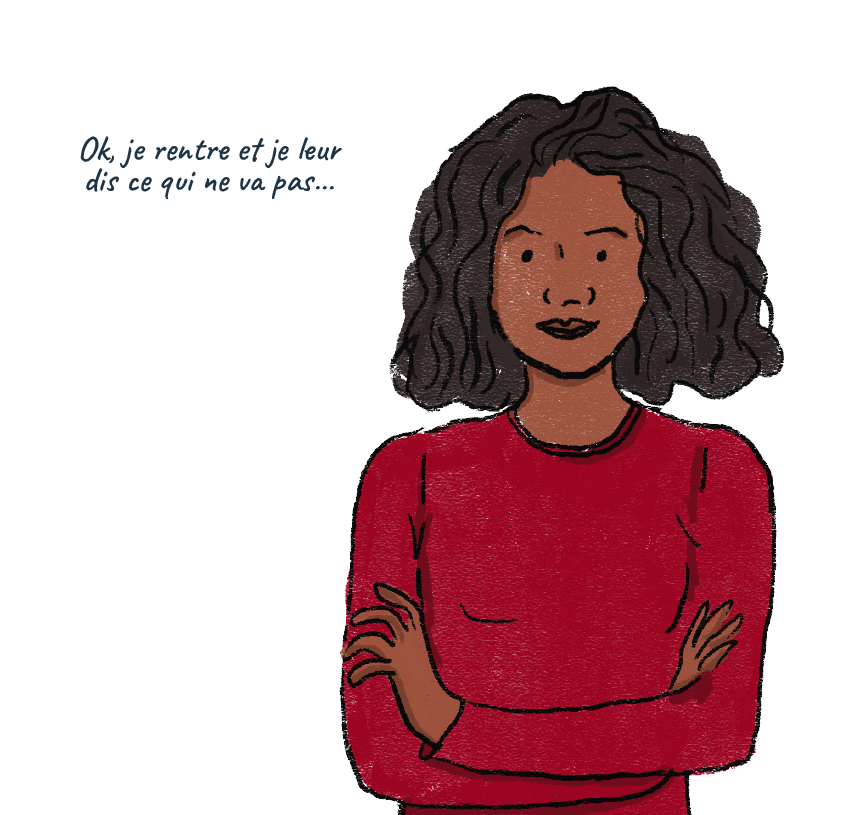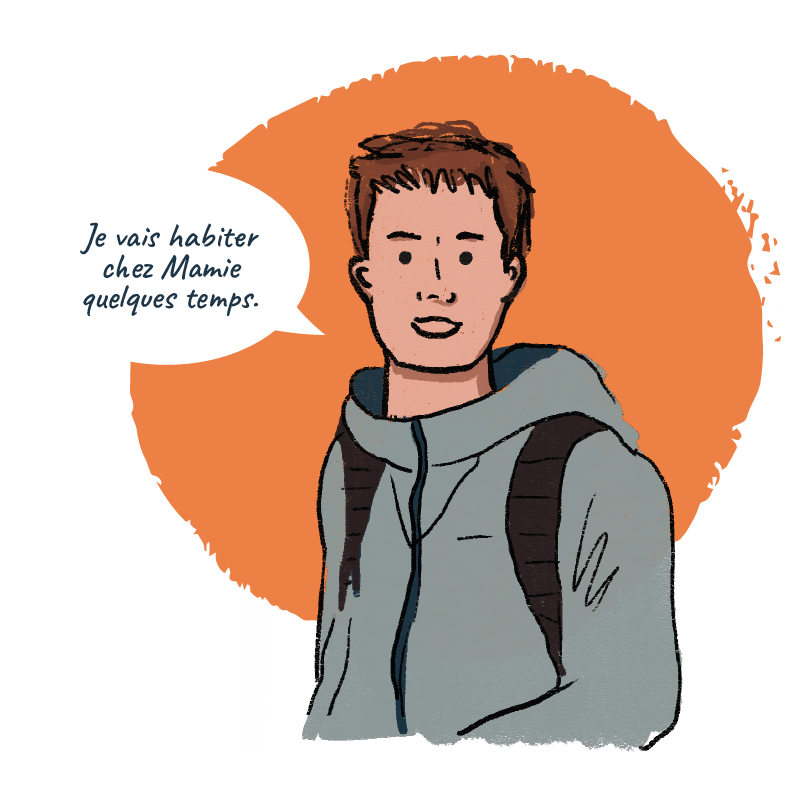What is a runaway?
Do you feel overwhelmed:
- frustration and/or conflicts at school,
- conflicts in your family or with your friends,
- unjust situations,
- lack of freedom,
- lack of affection,
- lack of safety...
In short, an overload you want to escape from.
But a runaway is not what you think.
So, what is a runaway?
"The act of leaving, temporarily, in an unexpected and secretive manner, your usual home, fleeing your usual environment."
(French Academy Dictionary)
Learn more

What are the risks of running away?
Civil law states that a minor, under 18 and not emancipated, cannot leave their family home without the consent of their parents or legal guardians.
Running away is not a crime: you will not be prosecuted if you decide to run away (Article 371-3 of the Civil Code).
However, even though it is not a crime, it is still considered a worrying disappearance of a child and can lead to consequences you might not have considered:

A runaway report will be filed with the police/gendarmerie, who will be tasked with finding you.
An investigation will then be conducted with your family, relatives, and school.

If you run away from your family environment: a concerning report may also be forwarded to Child Social Services (ASE).
Depending on your situation, ASE may decide to implement certain measures, such as family monitoring, institutional placement, or medical follow-up.

If you run away from an institution (foster home, family care): the impacts can vary, such as:
the suspension of your placement after a certain time, transfer to another facility, or reconsideration of some of your projects.
If you decide to run away, it doesn’t necessarily mean you will face all these consequences. Each runaway case is unique, depending on your situation.
Moreover, it means that any person who shelters a minor, without the consent of those with parental authority, commits an offense punishable by law: this is known as "child abduction" (Article 222-23-1 of the Penal Code).
These laws aim to ensure your safety and development, never forget that.


Thinking about running away?

Thinking about running away is not abnormal... and can be explained by science. It has long been known that when faced with an intense stress situation, our brain can react in three different ways: fight, flee, or endure. Thinking about it is okay!
The most important thing is to understand why you are thinking about it: do you want to escape from danger or distress? In both cases, you are not alone. Every problem has a solution: none should put you in more danger.
Running away is an act that is not insignificant. It generally happens after a strong emotion (rage, sadness, fear, euphoria, revolt, anger, joy, etc.) triggered by external events.
Take the time
to reflect

- Reflect on what you think and feel: sit down, write, draw, release all your emotions, cry, scream, in short, take time for yourself.
- Inform yourself about the options available to you, the consequences, and the possible impacts of running away.

...Or
take a break

Sometimes, letting the pressure subside and taking a step back can be beneficial to resolve a conflict. Running away often stems from the desire or need to take a break, whether for a day, a night, or a few days.
If you wish, it is important to think of a solution that, unlike running away, does not put you in danger:
- start by isolating yourself in your room or another room in your home and release all your emotions;
- seek help from a trusted person, a family member, or a third party who can provide emotional support;
- if you think you don't have someone to listen immediately: contact one of the available resources, you will always find a caring ear to listen to you.
WARNING:
- If you feel in immediate danger, call 17 (National Police)
- If you feel in danger, you can directly report your situation by calling 119 (Child Protection Hotline)
Feelings or emotions: what’s the difference?
Don’t stay alone
with your problems

- Talking, expressing what you feel and what you’re experiencing, is essential to facing difficult situations. It can be liberating, both for what weighs on you and to help you see more clearly and find solutions you hadn’t considered.
- Reach out to a friend, a family member, or a teacher - any trusted person who can help you see things more clearly or simply listen to you.

When you run away, the people around you may not always have your best interests at heart. Some may want to take advantage of your vulnerability. Don’t be fooled by appearances: girl or boy, woman or man, anyone can have bad intentions toward you.

Conversely, some people only want what’s best for you. They may be at school, in your immediate or extended family — in short, any responsible adult who will never try to influence you or use you to gain something.


Are you running away?
Your bag is ready. It’s decided, you’re leaving?
When you leave your home, people who care about you will start looking for you and call the police to find you as quickly as possible.
Remember: RUNNING AWAY = MORE RISK = LESS SAFETY
If nothing can change your mind, at least avoid putting yourself in too much danger:

1. Keep away from risks


Memorize or write down important phone numbers in case you lose your phone or run out of battery.

Sleep and stay only in places where you feel truly safe.

Avoid hitchhiking or getting into a stranger’s car, it can be more dangerous than you think.

All substances, alcohol or drugs, can be dangerous: be careful with what you’re offered to consume.

Be wary of people offering great plans to get you out of trouble: when alone, it’s easier to fall into networks and traffics (drugs, sexual exploitation) even if you think you can avoid them.

If you decide to meet someone you met online, do it in a public place and with another person.

If you feel in danger, run to a safe place like a supermarket, train station, or a convenience store. There will always be someone who can watch over you until the police arrive. If you feel truly in danger, don’t hesitate to call the police, your family, or someone you trust.
If you lack safety and comfort:
don’t hesitate to reach out to organizations that can help.
2. Stay in touch with loved ones


During your runaway, many people will worry about you.
You can reassure them by staying in touch with them. Communication is important to improve your situation, find solutions, and ease your return.
Keep in mind that at any moment, you can give updates via text, call, social media, or in person at a public place.
You can also ask a trusted person to help you:
- by helping you prepare for this contact;
- by calling the people who worry for you to reassure them;
- by accompanying you during the call and making the call with you.
You can also suggest your parents or guardians contact 116 000 Missing Children to prepare for your return.

DON’T FORGET
Whether you run away for a day, several weeks, or months, your safety and well-being will always come first!
3. You have the right to change your mind
Do you want to go home but don’t know how? Are you worried about how your parents or caretakers will react?
Leaving your home may have seemed necessary at some point. Now you realize that running away doesn’t solve everything. But it’s not easy to go back on your decision. Many questions might be running through your mind: what will people think of me? Why can’t I figure out what I want?
Changing your mind actually shows that you’re ready to address the crisis that led you to leave, and that you want things to change.

- Take control of your situation: try to think about what led you to run away and what you would like to change in your life once you're back.
- Don't endure this return as if you're being forced into it: by coming back on your own, you take control of your life again.

Taking action can happen step by step...
- Tell your parents or the people responsible for you that you want/are going to come back. They can call 116 000 for advice on how to make your return as smooth as possible.
- Talk to them about your return. Let them know how you’d like it to happen—eating, washing up, sleeping, talking, etc.
- Ask them to give you the time to express yourself when the moment feels right for you. At your own pace, you’ll be able to talk about what you're experiencing and/or what you experienced while away.

MOST IMPORTANTLY: if you have ideas or suggestions to make, don’t hesitate. You have a say in your life, and your opinion matters just as much as your loved ones'. By exchanging and comparing opinions and desires, you will find an arrangement that works for everyone.
- Coming back requires a lot of energy and willpower. You're taking control of your situation. The people waiting for you will most likely appreciate your decision.
- Facing your loved ones' reactions can be scary, but what you imagine is likely far from what will actually happen. Don’t let your fears control you.
- Upon your return, they will express emotions that may vary depending on their personality. They may react in many different ways: hugging you, crying, shouting… Like you, it’s an overflow of worry that’s being released, showing how much they cared about you.
I take the step: I go back home
You have stepped through the door. It's been a few hours, days, or even weeks since you left. Emotions are settling down: take the time to feel safe and rest.

Then, as soon as you feel ready:
re-establish the dialogue.
Talking will be the best way to express what you felt, feel, or what you would like to see change. If you can't really say what you feel: write it down or reach out to a neutral person or a mediator who can help you.


Don't hesitate to remind them to call 116 000, its teams can help you through this difficult time.
Communication is not possible?
there are alternatives to your return:
You no longer wish to run away, but you also don't want to return...
alternative solutions are available to you:
- A temporary solution:

If you feel in danger: there are Youth Reception and Listening Points (PAEJ) across France. You can go there to be listened to, supported, guided, and some offer shelter for a few nights. Check the hours before going and call them to see if they can offer you a temporary accommodation solution.

The law also allows you to benefit from the support of Child Welfare Services, including emergency accommodation in case of a runaway: for 72 hours and without your parents' authorization. Contact 119 for more information.
- A temporary or long-term solution:
You can suggest to your parents to stay for a while with a family member or a trusted person to take time to think and stay safe.

Trust the right people
You want to get help and you're looking for someone to support you? Do you already know you can trust a family member or a good friend? That's a very good start.
Sometimes, unfortunately, you may also feel that their support doesn't meet your needs, and you have the right to think so. You can then turn to other people who are part of your life and can listen to and support you without judgment:
- Your teacher or someone else who works at your school: a guidance counselor, a supervisor, a CPE;
- Your coach if you do sports or a youth leader;
- Your school nurse or your doctor;
- Any other person (usually an adult) who means well for you and whom you trust.
If these people can't support you, don't lose hope: there are many other resources. All these services are often available day and night, every day of the week. Don't hesitate to call them or use their chat service.
Also, if you feel in immediate danger: the police are there to help you. Their role is to ensure your safety. Don't hesitate to explain your situation to them; they can help you find a solution.

Get Help
What are my rights?
Just because you are a child doesn't mean you don't have rights, on the contrary!
You have the right to information
The law requires that both parents and children be informed of any decisions that concern them, unless such information goes against the best interest of the child (Article 17 of the 1989 Convention on the Rights of the Child, Article L.112-4 of the Social Action and Families Code).
You have the right to be heard by the Court
Every minor has the right to be heard in all decisions or proceedings that concern them (Article 9 of the 1989 Convention on the Rights of the Child, Article 388 and following of the Civil Code).
You have the right to approach the Judge alone
The Civil Code provides that the Juvenile Judge can be approached "by the child themselves." This means you can contact them directly. You will need to send a letter to the Juvenile Court based on your place of residence, addressed to the President of the Juvenile Court.
*Approaching a judge: the act of requesting to be heard by the judge to voice your demands or ensure your rights are respected.
You have the right to be accompanied by a lawyer
The Juvenile Judge can appoint a lawyer to represent your interests (what you wish to ask for or bring to the judge's attention). You can also request one yourself, by sending a letter to the Bar Association's President. You may qualify for legal aid* if your parents are unable to assist you financially. This aid applies whether you are a victim or accused of a criminal offense.
*Legal aid: a financial assistance granted to cover all or part of the lawyer's and procedural fees.
You have the right to maintain contact with your parents
When you are under the care of the child protection system, you have the right to maintain regular contact with your parents and/or anyone in your environment, unless it goes against your best interests*.
*The best interests of the child: all the rights (to a home, to education, to speak, etc.) and needs (for protection, security care, etc.) of minors.
They can help you
In cases of serious, imminent, or immediate danger, you should contact emergency services
17: the police or gendarmerie
18: the firefighters
15: the SAMU
112: the European emergency number
114: for the deaf and hard of hearing (SMS)
Don’t panic! If you dial the wrong number, the operator will redirect your call to the appropriate service.
119 (Allô Enfance en Danger) :
A national number, available every day of the year, 24/7, and free from all phones (landline, mobile, public phones). This number ensures call confidentiality and does not appear on any phone bill.
Other ways to contact 119:
- Via chat by clicking here. To access the chat, simply choose your department from the dropdown menu. This service is available every day of the year from 3 PM to 9 PM.
- A platform for communication in French sign language is available by clicking here. It is open Monday to Friday from 8:30 AM to 10 AM and Saturday from 7 PM to 9 PM.
Numbers for
young minors
3018 (E-enfance) : a number for young people who are victims of harassment and digital violence (online).
- Free and anonymous call, available 7 days a week from 9 AM to 11 PM. Other ways to contact 3018: Via chat on Facebook / Via email.
3114 : national suicide prevention number. Free and confidential call, available 7 days a week, 24/7.
- Visit their website, where many resources are available: I am in distress - 3114
Première(s) Fois : to answer all the questions you may have about your life between 10 and 14 years old: relationships with friends, school, family, and yourself.
- Click the "I need to talk" button at the top right of the website: a chat will open where you can communicate with a responder. It's available Monday to Thursday from 10 AM to midnight and Friday to Saturday from 10 AM to 9 PM.
En Avant Toutes : The chat to listen, advise, and redirect. Free, anonymous, secure, and caring, it allows you to connect with professionals who listen, advise, and direct you to appropriate services.
Le Refuge : If you are a young LGBTQIA+ person in distress, you can contact the listening line at 06.31.59.69.50, by SMS or phone. It's available 24/7. The website also provides thematic resources for young people.
Le Fil Santé Jeune : an anonymous and free service for young people aged 12-25, available every day from 9 AM to 11 PM. You can contact them at 0800 235 236 or via Chat' FSJ, where you can communicate for free with a professional: doctor, psychologist, educator, or counselor. Open every day from 9 AM to 10 PM.
